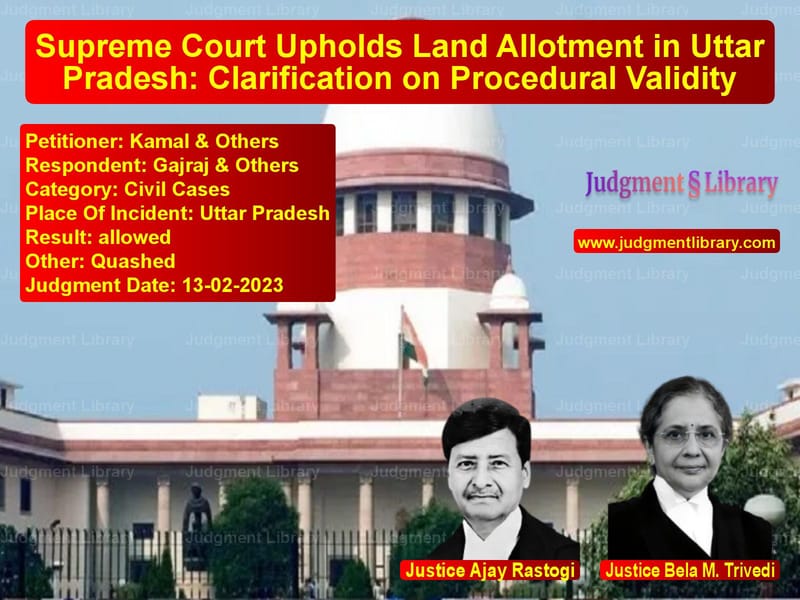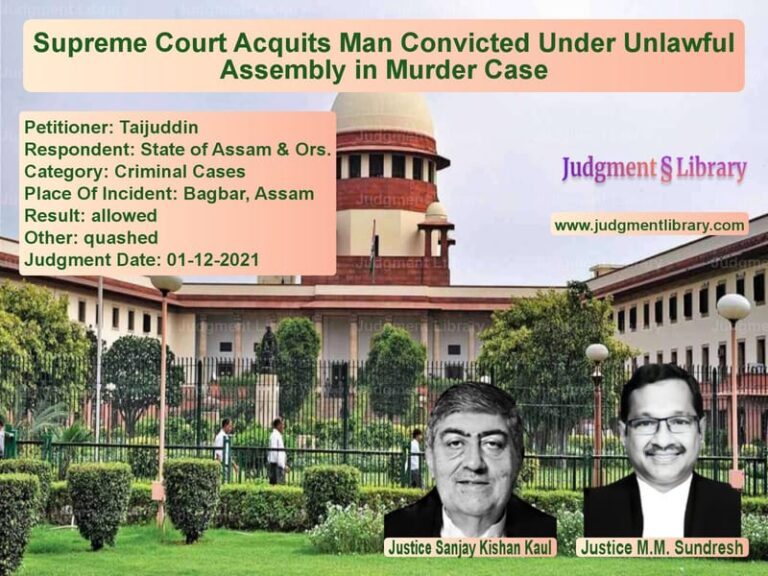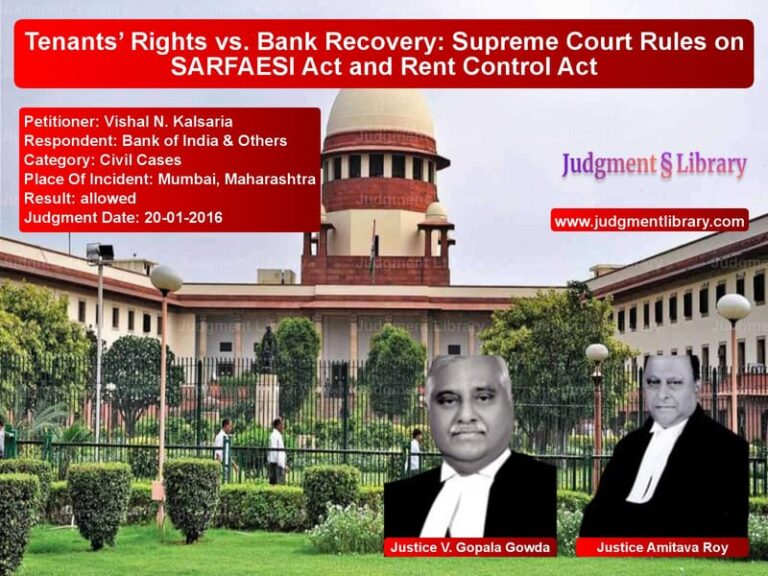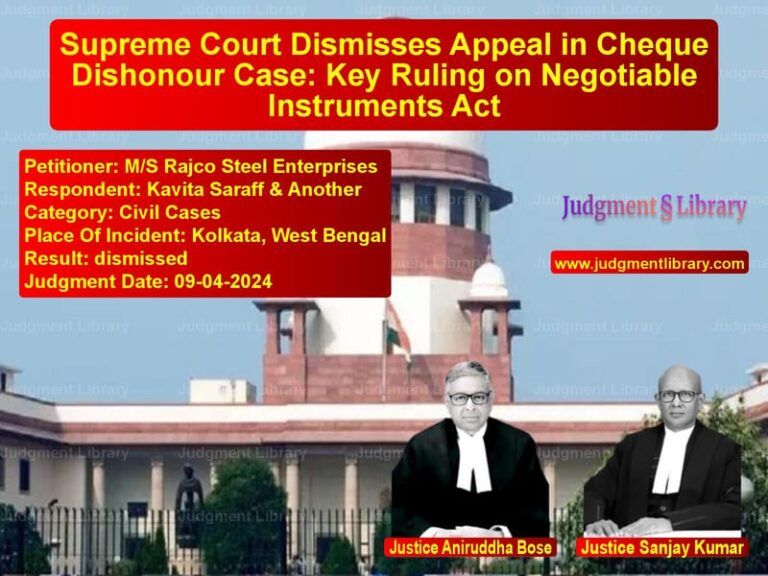Supreme Court Upholds Land Allotment in Uttar Pradesh: Clarification on Procedural Validity
The Supreme Court of India, in the case of Kamal & Others vs. Gajraj & Others, ruled in favor of land allottees whose allotments were challenged based on procedural delays in approval. The Court set aside the Allahabad High Court’s decision, reaffirming that administrative delays should not invalidate legally sanctioned land allotments. This landmark ruling ensures that rightful beneficiaries are not deprived of land due to technicalities in the decision-making process.
Background of the Case
The case revolves around land allotment to landless individuals under the Uttar Pradesh Zamindari Abolition and Land Reforms Act, 1950. The Land Management Committee of Village Phaleda approved the allotments in a meeting on July 20, 1996. Following this, the Sub-Divisional Magistrate (SDM) granted final approval on April 6, 1997.
However, a challenge was raised by Gajraj, a third party with no direct stake in the process. He contended that the SDM’s approval was granted beyond the one-week period mandated by Rule 176(4) of the Uttar Pradesh Zamindari Abolition and Land Reforms Rules, 1952. Accepting this argument, the Allahabad High Court quashed the allotments and ordered a fresh review.
The appellants, Kamal and others, were adversely affected by this decision and approached the Supreme Court for relief.
Arguments by the Appellants (Kamal & Others)
- The appellants contended that they had followed all legal procedures, and the delay in the SDM’s approval was beyond their control.
- They argued that Rule 176(4) prescribes an ideal timeframe but does not stipulate that non-compliance would render the allotment void.
- They pointed out that multiple levels of scrutiny, including the Additional Collector and Additional Commissioner, had upheld the allotments, and no procedural or substantive irregularities were found.
- The High Court’s ruling was based solely on a technicality and did not consider the merits of the allotments.
Arguments by the Respondents (Gajraj & Others)
- The respondents asserted that the SDM’s approval violated Rule 176(4), which requires a decision within a week of receiving recommendations from the Land Management Committee.
- They claimed that the delay—spanning eight months—invalidated the approval process.
- They argued that the delay suggested potential administrative bias or manipulation.
Supreme Court’s Analysis and Judgment
The Supreme Court examined the application of Rule 176(4) and the procedural history of the case. The key observations were:
- Administrative Delays Do Not Invalidate Substantive Rights: The Court held that while Rule 176(4) prescribes a timeframe for approval, its non-compliance does not automatically invalidate an otherwise legal allotment.
- Validity of Decision-Making Process: The Court emphasized that the allotments were examined at multiple levels, including the Additional Collector and Additional Commissioner, and no irregularities were found.
- Stranger to the Proceedings: The Court noted that Gajraj was not an applicant for the allotment and had no direct interest in the land, raising concerns about his legal standing to challenge the process.
- Non-Compliance of Timeframe Not Fatal: The Court stated that administrative delays caused by authorities should not be used to penalize the beneficiaries of an allotment.
The Supreme Court ruled:
“The High Court has committed a serious error in interpreting Rule 176(4). Non-compliance with the one-week timeframe does not contain any consequential effect that invalidates the proceedings. The allotments, having been scrutinized at two levels, do not warrant fresh examination.”
Judicial Precedents and Legal Framework
The Court referred to previous rulings where administrative delays were deemed insufficient to vitiate decisions taken in good faith. It emphasized that laws should be interpreted in a manner that promotes justice rather than creating undue hardships for legitimate beneficiaries.
Read also: https://judgmentlibrary.com/supreme-court-overrules-high-court-on-land-acquisition-lapse-in-delhi/
Rule 176(4) was intended to ensure speedy decision-making but was not framed as a mandatory provision with penal consequences. The Court clarified that an interpretation rendering legitimate allotments void due to bureaucratic inefficiency would be unjust.
Final Verdict
- The Supreme Court set aside the Allahabad High Court’s decision.
- The land allotments were upheld, restoring the rights of the appellants.
- The judgment reinforced that procedural delays by authorities should not unjustly affect beneficiaries of legally sound decisions.
- The Court directed that no further challenges based on the same grounds be entertained, ensuring finality in the matter.
Implications of the Ruling
This ruling sets a significant precedent in land allotment cases where administrative delays are used as grounds to challenge approvals. It establishes that beneficiaries should not suffer due to bureaucratic inefficiencies. The judgment also clarifies that third parties with no direct interest should not be allowed to challenge allotments without substantial cause.
Read also: https://judgmentlibrary.com/supreme-court-quashes-property-auction-due-to-procedural-violations/
By upholding the principle that procedural delays do not negate substantive rights, the Supreme Court has ensured that the objectives of land reform laws remain intact. This decision will likely serve as a guiding principle in future cases involving similar challenges.
The ruling protects land allottees from arbitrary challenges based on procedural technicalities and ensures that legal entitlements are not unfairly revoked due to administrative inefficiencies.
Petitioner Name: Kamal & Others.Respondent Name: Gajraj & Others.Judgment By: Justice Ajay Rastogi, Justice Bela M. Trivedi.Place Of Incident: Uttar Pradesh.Judgment Date: 13-02-2023.
Don’t miss out on the full details! Download the complete judgment in PDF format below and gain valuable insights instantly!
Download Judgment: kamal-&-others-vs-gajraj-&-others-supreme-court-of-india-judgment-dated-13-02-2023.pdf
Directly Download Judgment: Directly download this Judgment
See all petitions in Property Disputes
See all petitions in Judgment by Ajay Rastogi
See all petitions in Judgment by Bela M. Trivedi
See all petitions in allowed
See all petitions in Quashed
See all petitions in supreme court of India judgments February 2023
See all petitions in 2023 judgments
See all posts in Civil Cases Category
See all allowed petitions in Civil Cases Category
See all Dismissed petitions in Civil Cases Category
See all partially allowed petitions in Civil Cases Category







